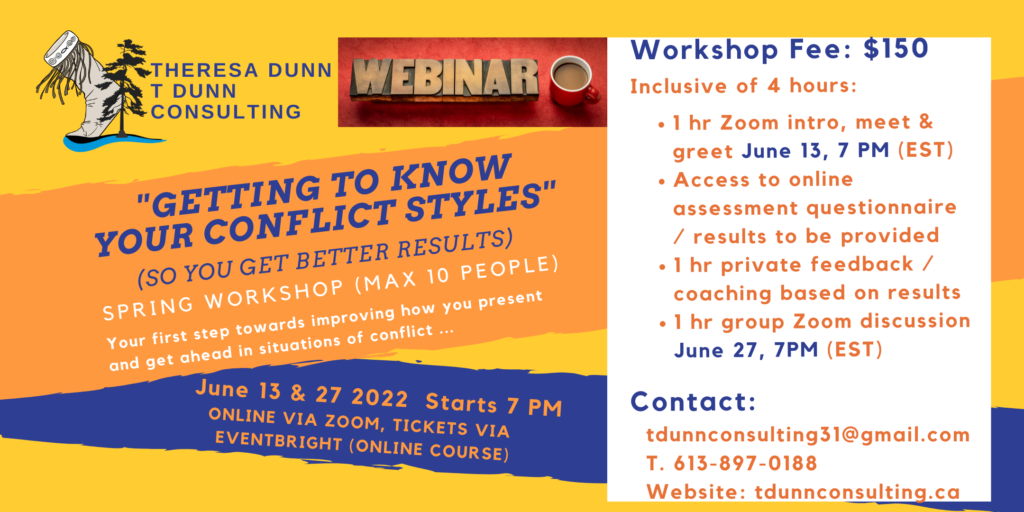
For those who find learning with others helpful, I am running a workshop on Getting to Know Your Conflict Styles. The first part of the workshop will start on June 13th, 2022, at 7 PM. Tickets
Why do I think it benefits anyone to do this workshop?
I have come to believe, that for the first part of our lives, we mainly reflect the values and beliefs that have been generated by family, friends, community, faith group, or the other many influences in our lives. We are mirroring the effect of those influences, whether we are choosing to think and act like them, or to act or think in opposition to something we reject.
Later in life, we begin to come out of the cocoon we were raised in, and begin to unravel the layers of our being. We may begin to see parts of ourselves that we didn’t recognize before. Some we might like, and some we might not like.
What does this have to do with conflict? Many of us are uncomfortable with conflict; whether it be over arguments about who cleans the kitchen, to breaching of international territories. There seems to be an expectation that conflict will involve loss, pain, irreparable damage to relationships, or physical environment, unwanted change, and generally, reduce control over our lives.
Understanding how you respond to conflicts, and your style, provides much needed information on how half of the conflict is being produced. This is the part you can manage and choose for yourself. You can make the decisions, such as if you will participate in a conflict that ends in destruction, or ends in a constructive outcome.
These conflict styles are developed through our genetic traits, and the environment we grew up in. Each person holds a unique mix of traits and states that filter how we respond to situations in our life. Many psychological disciplines understand that different kinds of people will have different reactions to conflict. For example, some personalities may face conflict by withdrawing, avoiding any direct mention of the discord, or “stonewalling”, to prevent any unwanted engagement. Others will face conflict with a tirade of accusations, name-calling, yelling, and the like. It might seem that these two types of people would be totally incompatible, yet practitioners in conflict resolution, as well as psychologists, understand that underneath all the presenting behaviours, people generally want the same things: to feel secure in their connection, to feel and know by the actions of the other they are heard, understood, and loved unconditionally. Learning about conflict styles, that is, how we face the diverse conflicts that will arise throughout our lives, will help us understand the choices we have in those circumstances, and therefore, have more control over the outcome. Even members of your own family will not respond exactly to conflict the way you do.
Knowing more about these qualities, and how they are affected by the qualities of others, helps us to understand:
- How and why we react to conflicts
- How we choose the style we will use, and
- What type of strengths we have in a situation
Some tools, for identifying styles of approaching conflict, have been designed. They are in the form of questionnaires or inventories. The term “inventory” suggests you would be creating a list of qualities you hold in conflict. Given the background of the author, the tools will reflect various types of situations or mindsets, that people assert, such as, but not limited to:
- Direct or Take charge (do it my way)
- Accommodate (I will do what you need to be done)
- Cooperate (help me understand what you want and please listen to me so we can find some solution that works for both of us), and/or
- Avoid conflict at the first signs of discord
One of these tools I have used and referenced in my work is the Thomas Kilmann Instrument, generally used for workplace or organizational settings, and has become the foundation for an evolution of versions. Two other tools, that reference the Thomas Kilmann Instrument, were developed by peacebuilders, and reflect the goals of finding healthy ways to work towards constructive outcomes; that preserve the people involved and create the possibility of transforming a relationship, to be easier on the people affected.
The Styles Matters Inventory, by Ron Kraybill, explores our responses to conflict when the situation is calm, and when it is causing distress (the storm.) The resources emphasize that all styles have a benefit to the user and if note problems if any one style is overused.
The Conflict Styles Root Assessment, by the Canadian International Institute of Applied Negotiation (CIIAN), has created a map of how we in mind, body, and spirit, engage in a conflict to either solve it with methods to face the conflict constructively; or soothe, that is to keep the conflict going through unhealthy means of avoiding, distracting, pursuing and/or disconnecting.
Understanding ourselves, in the dynamics of being a human being, is an ongoing endeavour. We are enriched with many ways to explore these dynamics, to ensure we choose the ones that let us be our true or best Self.
Interested in learning more? It is important to explore your conflict style so as to consciously make choices that reflect an understanding of how your style may be experienced by others. Learning what conflict skills are available to you to respond more effectively to situations, is a skills-set that can be beneficial throughout life.
As I mentioned, at the beginning of this blog, I am running a workshop on Getting to Know Your Conflict Styles. The workshop cost, when you register for the June 13th, 7PM workshop, includes all of the following:
This workshop will run over two (2) weeks to allow for:
- June 13th at 7 PM … a one-hour introduction, to a maximum of ten (10) participants, explaining the foundation of the tool you will be using, identifying the questions you want to answer by doing this process, and getting your access code to your Conflict Styles Inventory;
- Over the next two (2) weeks you will complete your online inventory form on your own, contemplate your results, and have a one-hour, one-on-one coaching session with me (via Zoom or phone);
- On June 27th at 7 PM, I will facilitate a one-hour group Zoom closing, that will involve sharing a summary of what you gleaned from the process (if you wish to share), exploring your next steps in learning more about yourself, and sharing a celebration for the self-care you gifted yourself.
Be sure to register on Eventbrite as soon as possible to reserve your workshop seat: Tickets. The first 5 to sign up by May 31 will see a 30% discount Early Bird pricing on the registration fee. Please see my website at tdunnconsulting.ca; or contact me if you have any questions, or need anything clarified, via email: tdunnconsulting31@gmail.com.



